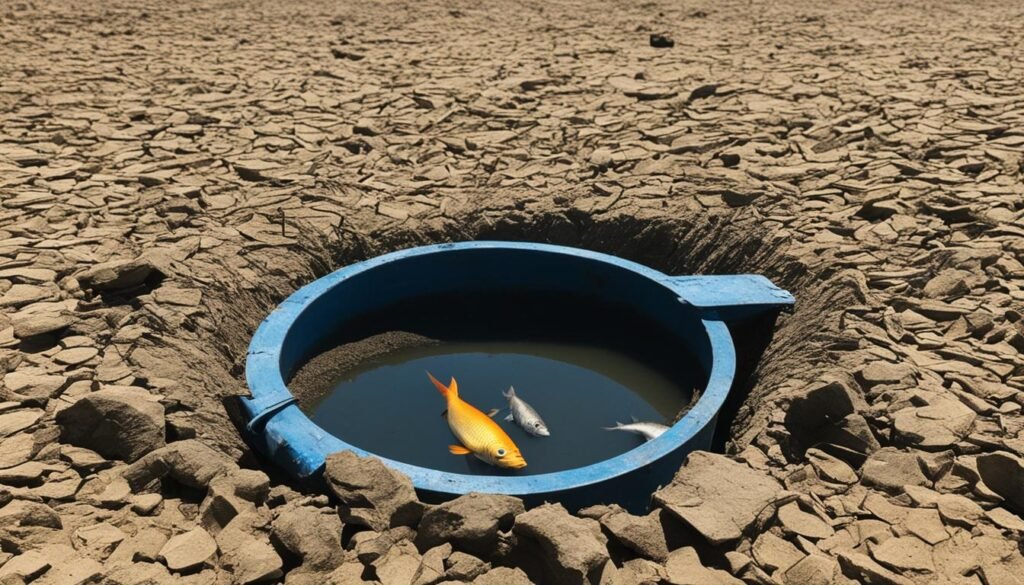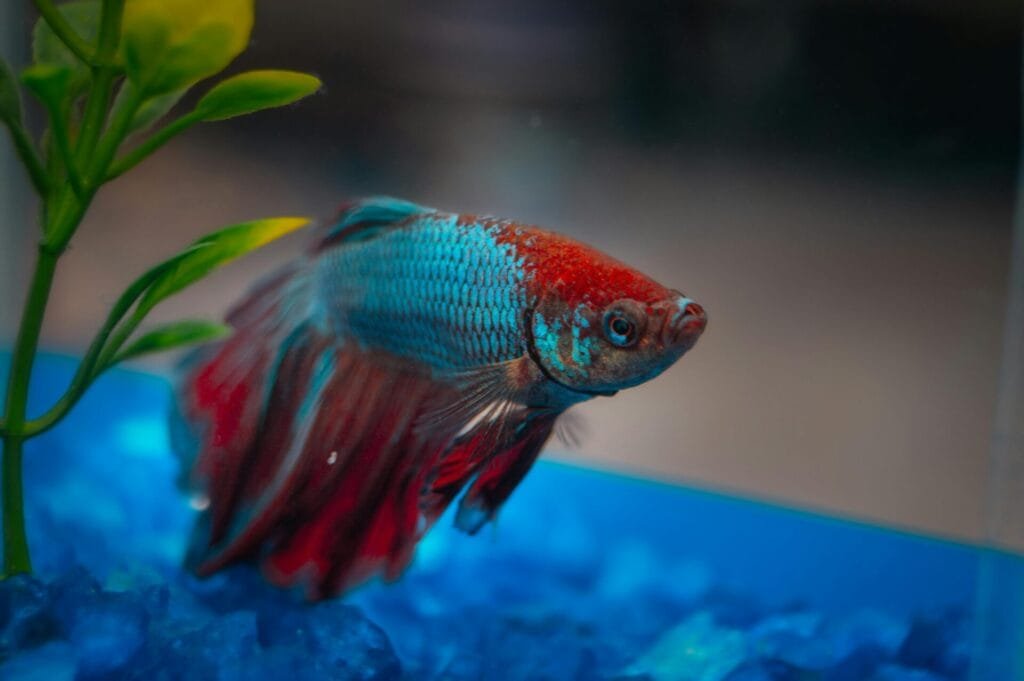Have you ever wondered how long a fish can survive outside of its natural aquatic habitat? The ability of fish to survive out of water is a fascinating topic that depends on various factors. From species-specific adaptations to environmental conditions, the duration of a fish’s survival without water can vary significantly.
When a fish is removed from water, it experiences physiological changes that can have both immediate and long-term effects. Some fish can only survive for a few minutes before experiencing distress and suffocation, while others can endure for hours or even months without water.
Factors such as air-breathing capabilities, oxygen requirements, and temperature play crucial roles in determining a fish’s ability to survive outside of water. Some fish have developed adaptations that allow them to breathe air or absorb oxygen through their skin, increasing their chances of survival. Others have slower metabolisms or live in colder water, enabling them to stay out of water for longer periods.
The survival time without water also varies among different fish species. Freshwater fish generally have shorter survival times compared to saltwater and amphibious species. Pet fish, such as goldfish, can survive for about 10 minutes outside of water, while labyrinth fish with their special respiratory organ can endure up to 2 hours.
Amphibious fish have unique adaptations that enable them to spend a significant amount of time outside of water. Some species, like mudskippers and lungfish, possess physical adaptations for breathing through gills, skin, or modified air bladder respiratory systems, allowing them to survive for up to a few hours or even days outside of water.
On the other hand, large ocean fish, such as sharks, have limited abilities to survive out of water. While their larger size may allow them to maintain oxygen levels for a bit longer, sharks still require water to survive and can typically endure only a few minutes to several hours outside of their aquatic environment.
In conclusion, the ability of a fish to survive out of water is a complex subject that depends on its species, adaptations, and environmental factors. It is crucial to minimize the time fish spend out of water to prevent stress and ensure their well-being. By understanding the factors that influence fish survival without water, we can better appreciate their incredible abilities in both aquatic and non-aquatic environments.
Factors Affecting Fish Survival Without Water
The ability of a fish to survive out of water is influenced by various factors. Some fish have adaptations that allow them to breathe air or absorb oxygen through their skin, increasing their ability to stay out of water for longer periods. Additionally, fish with slower metabolisms and those living in colder water can generally survive longer without breathing. However, fish caught in warm water require more oxygen and may not survive as long out of the water. The longer a fish is out of water, the more oxygen it will require to recover, so it’s important to return it to the water quickly.
| Factors | Influence on Fish Survival Without Water |
|---|---|
| Adaptations | Allow fish to breathe air or absorb oxygen through their skin, increasing their ability to survive out of water. |
| Metabolism | Fish with slower metabolisms can generally survive longer without breathing. |
| Water Temperature | Fish caught in warm water require more oxygen and may not survive as long out of the water. |
Fish Species’ Survival Time Out of Water
The survival time of fish out of water can vary significantly depending on the species. Factors such as habitat, adaptations, and physiological characteristics play key roles in determining the maximum time for fish to survive without water. Here, we explore the survival abilities of different fish species and their respiration mechanisms outside of water.
Freshwater Fish
Freshwater fish generally have shorter survival times compared to their saltwater and amphibious counterparts when out of water. The low salinity environment of freshwater habitats affects their ability to maintain internal water balance, making them more vulnerable to dehydration and stress. As a result, freshwater fish typically have a limited capacity to survive out of water.
Saltwater Fish
Saltwater fish, on the other hand, have a higher tolerance for being out of water due to their adaptation to oceanic environments. Their bodies have evolved to withstand higher salt concentrations, allowing them to better maintain internal water balance when exposed to the air. As a result, saltwater fish generally have a longer survival time out of water compared to their freshwater counterparts.
Pet Fish
When it comes to pet fish, the survival time out of water can vary depending on the species and their specific adaptations. Goldfish, for example, are a common pet fish that can survive for about 10 minutes outside of water, given favorable conditions. However, it is essential to minimize their time out of water to prevent suffocation and minimize stress.
Labyrinth fish, including bettas and gouramis, possess a specialized organ called the labyrinth organ that allows them to breathe air. This unique adaptation enables them to survive for longer periods outside of water compared to other fish species. Labyrinth fish can typically survive up to 2 hours out of water, thanks to their efficient respiration mechanism.
Amphibious Fish
Amphibious fish have remarkable adaptations that enable them to spend a significant amount of time out of water. These fish possess traits that allow them to respire through their skin, gills, or modified air bladder respiratory systems. As a result, some amphibious fish species can spend up to 75% of their lives on land, surviving for extended periods without water.
Large Ocean Fish
Large ocean fish, such as sharks, have varying abilities to survive out of water. While their larger body size allows them to maintain oxygen levels for longer periods compared to smaller fish, they still require water to survive. The survival time of large ocean fish out of water can range from a few minutes to several hours, depending on factors such as species, environmental conditions, and stress levels.
To summarize, the survival time of fish out of water is influenced by various factors, including species, habitat, adaptations, and physiological characteristics. The table below provides an overview of the maximum time different fish species can survive without water:
| Fish Species | Maximum Survival Time Out of Water |
|---|---|
| Goldfish | Approximately 10 minutes |
| Labyrinth Fish (Bettas, Gouramis) | Up to 2 hours |
| Amphibious Fish | Varies among species; up to several days |
| Large Ocean Fish (Sharks) | Minutes to several hours |
It is important to note that the provided survival times are averages and can vary based on individual factors, environmental conditions, and stress levels experienced by the fish. Understanding the specific needs and limitations of different fish species is essential for their welfare and proper care.
Out-of-Water Survival of Pet Fish
Pet fish, such as goldfish, have shorter survival times outside of water compared to other fish species. Freshwater pet fish can typically survive for about 10 minutes, while the most petite types of aquarium fish may only survive for 10 minutes.
It is crucial to minimize a pet fish’s time outside of water to prevent suffocation and minimize stress. Keeping their gills moist is essential for their survival.
Freshwater Pet Fish Survival Times
When it comes to freshwater pet fish survival, timing is everything. Different species of pet fish have different tolerances for being out of water, with some being more resilient than others. Here are some examples of survival times for popular freshwater pet fish:
- Goldfish: Goldfish can typically survive for about 10 minutes outside of water. However, their survival time can vary depending on factors such as water temperature and the individual fish’s health.
- Betta Fish: Betta fish, also known as Siamese fighting fish, are small, labyrinth-breathing fish that can survive for about 10 minutes without water. They have a special organ called a labyrinth organ, which allows them to extract oxygen from the air.
- Guppies: Guppies are small, hardy fish that can survive for up to 10 minutes out of water. Their ability to survive is attributed to their adaptable nature and their ability to supplement their oxygen needs by breathing air from the water’s surface.
- Tetras: Tetras are small, schooling fish that can survive for about 10 minutes outside of water. They have a high oxygen requirement and need to be returned to the water quickly to prevent suffocation.
As responsible pet owners, it is important to ensure that our pet fish are not subjected to prolonged periods outside of their aquatic environment. Although they might survive for a short time out of water, their well-being and overall health can be severely compromised. It is best to keep their gills moist and quickly return them to the water to minimize stress and promote their survival.
Amphibious Fish and Their Survival Abilities
Amphibious fish possess remarkable abilities that enable them to survive outside of water for extended periods. These unique species have adapted to breathe through various mechanisms like gills, skin, or modified air bladders. Depending on the specific species, amphibious fish can thrive outside of water for several hours or even days.
One striking example of an amphibious fish is the mudskipper. Found in tropical regions, mudskippers have specially adapted pelvic fins that allow them to walk on land and breathe through their skin. These fascinating creatures can spend a significant amount of time outside of water, navigating muddy habitats and even climbing trees.
Lungfish, another type of amphibious fish, possess lungs that enable them to breathe air. This adaptation allows them to survive in stagnant or oxygen-poor water environments. Lungfish can remain out of water for extended periods, ensuring their survival even when their aquatic habitats dry up.
Fish species that inhabit mangrove swamps are also considered amphibious. These fish have the ability to tolerate both freshwater and saltwater environments and can venture onto land during low tide. They possess unique adaptations that enable them to extract oxygen from the air and survive in the harsh conditions of mangrove ecosystems.
In summary, amphibious fish demonstrate incredible survival abilities that allow them to thrive outside of water. Their adaptations for breathing and navigating terrestrial environments contribute to their ability to survive for extended periods, making them remarkable creatures in the animal kingdom.
Survival of Large Ocean Fish Out of Water
Large ocean fish, such as sharks, possess remarkable survival abilities in their aquatic habitat. However, when removed from water, their out-of-water survival is limited compared to other fish species.
The size of these large ocean fish plays a crucial role in their ability to maintain oxygen levels and survive out of water for a longer period. With their larger body size, sharks have a higher capacity to store oxygen, allowing them to endure short periods out of water.
Despite their adaptation to brief out-of-water episodes, large ocean fish, including sharks, still depend on water for survival. This highlights the significance of their natural environment in meeting their physiological needs.
In contrast to sharks, some fish species possess extraordinary adaptations that enable them to stay out of water for extended periods or even spend a significant part of their lives on land. One example is the mudskipper, a unique amphibious fish that can survive outside of water for extended periods due to its ability to breathe through its skin and specialized gills.
While large ocean fish like sharks have limitations in their out-of-water survival, their strength and resilience in their aquatic environment make them fascinating creatures with crucial roles in marine ecosystems.
| Fish Species | Out-of-Water Survival Time |
|---|---|
| Sharks | A few minutes to several hours |
| Mudskippers | Several hours to days |
| Goldfish | 10 minutes |
| Labyrinth fish | Up to 2 hours |
| Amphibious Fish | Varies depending on species, up to several hours |
Sources: oceansciencejournal.org, deeperblue.com
Walking Catfish and Their Adaptations
Walking catfish are fascinating fish species known for their unique survival abilities outside of water. These fish have developed specialized adaptations that enable them to breathe air and even move on land using their pectoral fins.
One of the most remarkable features of walking catfish is their ability to survive for extended periods without water. While their out-of-water duration is limited compared to amphibious fish, walking catfish can still manage to survive up to 18 hours on land, depending on environmental conditions.
The survival abilities of walking catfish are attributed to several key adaptations. These include:
- Air-Breathing Mechanism: Walking catfish possess a unique respiratory structure in their gills that allows them to extract oxygen from the air. This adaptation enables them to supplement their oxygen needs when out of water.
- Mobility on Land: Unlike other fish species, walking catfish have well-developed pectoral fins that enable them to crawl and wiggle their way across land. This remarkable ability allows them to travel significant distances in search of suitable habitats or food sources when necessary.
- Survival Instincts: Walking catfish also exhibit remarkable survival instincts, such as their ability to detect suitable water sources even while on land. When water becomes scarce, they can use their sensory organs to detect moisture in the soil and make their way towards potential water sources.
Despite their impressive adaptations, walking catfish are still dependent on water for survival. They need water to reproduce, maintain their body temperature, and replenish their hydration levels. Therefore, while they can endure longer periods without water when compared to other fish, they must ultimately return to aquatic environments to thrive.
Conclusion
The survival abilities of fish out of water are diverse and fascinating. Various factors such as species, adaptations, and environmental conditions influence how long fish can survive without water. While some fish can only survive for a few minutes, others have the remarkable ability to endure hours or even months.
Air-breathing capabilities and oxygen requirements play crucial roles in determining a fish’s survival abilities out of water. Some fish possess adaptations that allow them to breathe air or absorb oxygen through their skin, extending their survival time. Additionally, temperature also affects their ability to survive, with fish in warmer water requiring more oxygen and having shorter survival times.
To ensure the well-being of fish, it is important to minimize the time they spend out of water and return them to their aquatic habitat as soon as possible. This helps reduce stress and the risk of suffocation. Understanding the unique abilities and limitations of different fish species can guide our efforts in preserving their natural habitats and promoting their survival in both aquatic and terrestrial environments.


